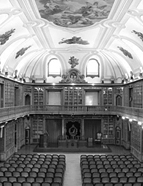

Until 1916, there were essentially three History teachers: António de Vasconcelos, Francisco Martins (1848-1916), a former teacher of Sacred and Ecclesiastical History, and Porfírio António da Silva (1855-1919), a lecturer in Theology and Dogmatics. They were also joined by Manuel Gonçalves Cerejeira (1888-1977) in 1916, a provisional assistant who held a degree in Historical and Geographical Sciences, and later on (1921-1926), João José de Brito e Silva.
Since there were insufficient teachers and assistants to keep all the subjects assigned to the 4th Cluster in the Faculty open, including those of the Escola Normal Superior (1915-1930) under its charge, some of them had to be taught by teachers from other Clusters, which was what occurred over time whenever necessary, including teachers from Law and Medicine, and sometimes from secondary school (1914).
The History courses, at the baccalaureate (1911-1918) and undergraduate level, were twinned with Geography until 1930, representing the knowledge of the Historical and Geographical Sciences. However, the doctoral degrees were separated into two specialised fields in 1918, which perhaps justifies the non-emergence of a geographer bonanza among the history teachers, precisely in counter-cycle to the scenario in France, where the first two generations of the Annales only claimed the geographic heritage of the past. The later union with Philosophy (1930-1957) would, on the contrary, leave its mark on some of the historians who graduated in Historical and Philosophical Sciences.
Among the initial History teachers, A. de Vasconcelos stood out as a prominent figure. His retirement in 1930 marked the first phase of the history of the 4th Cluster, which almost coincided with the departure of Gonçalves Cerejeira in 1928. New paths saw the hiring of assistants Mário Brandão (1928) and M. Lopes de Almeida (1930); of Damião Peres, full professor by public tender in 1931, from the dissolved (1928) and then closed Faculty of Arts of Porto; and in 1937, Torquato Soares of the same origin. The second generation of teachers of the History Cluster had been born, or was already blossoming, to be joined on 30 March 1941, by the medievalist emeritus Father Pierre David (1882-1955).
